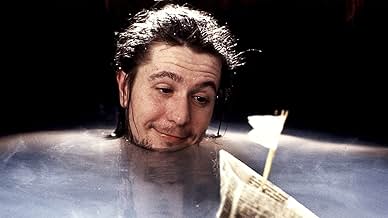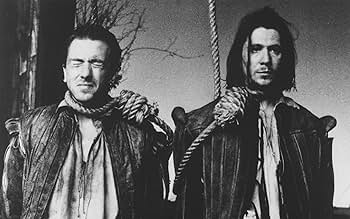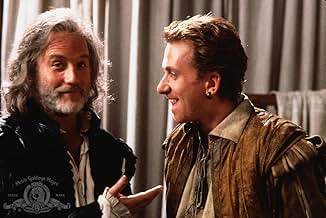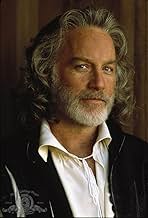Rosencrantz & Guildenstern Estão Mortos
Título original: Rosencrantz & Guildenstern Are Dead
Dois personagens secundários da peça 'Hamlet' tropeçam, desconhecendo suas vidas planejadas e incapazes de se desviar delas.Dois personagens secundários da peça 'Hamlet' tropeçam, desconhecendo suas vidas planejadas e incapazes de se desviar delas.Dois personagens secundários da peça 'Hamlet' tropeçam, desconhecendo suas vidas planejadas e incapazes de se desviar delas.
- Direção
- Roteirista
- Artistas
- Prêmios
- 3 vitórias e 2 indicações no total
Serge Soric
- Tragedian
- (as Srdjan Soric)
Sven Medvesek
- Laertes
- (as Sven Medvesck)
Avaliações em destaque
Rosencrantz and Guildenstern Are Dead was one of my favourite films whilst growing up. The movie follows two irrelevant characters (irrelevant in that although they served a significant purpose, their characters were not developed in any depth... Rosencrantz and Guildenstern, as individuals, were relatively unimportant) through one of the most renowned stories ever told (Hamlet). It is a film about two characters that are completely unaware of the magnitude of the events taking place around them. This carries on throughout the entire film, and is also evidenced in their accidental discoveries of significant historical scientific findings (such as the steam engine or the concept of gravity). The characters stumble their way through the film, unaware of the consequences to their actions or their significance or importance.
The characters spend the entire film coming to terms with their existence. Shakespeare didn't provide any detailed character development of either Rosencrantz or Guildenstern, and as such, they are left confused as to the purpose of their own existence.
The film also looks at the concept of a predetermined destiny. Rosencrantz and Guildenstern's fate is already determined before the film begins. And although they play an important role in one of the greatest stories ever told, they are completely unaware of their destiny; they are merely victims of circumstance.
I should also note that the constant banter between the two characters (specifically in their 'Game of Questions') is pure quality.
The characters spend the entire film coming to terms with their existence. Shakespeare didn't provide any detailed character development of either Rosencrantz or Guildenstern, and as such, they are left confused as to the purpose of their own existence.
The film also looks at the concept of a predetermined destiny. Rosencrantz and Guildenstern's fate is already determined before the film begins. And although they play an important role in one of the greatest stories ever told, they are completely unaware of their destiny; they are merely victims of circumstance.
I should also note that the constant banter between the two characters (specifically in their 'Game of Questions') is pure quality.
So I was sitting around watching TV on a Sunday afternoon... or
trying too, anyway. Tragically there was nothing on... until my eye
caught a title; Rosencrantz and Guildenstern Are Dead. My inner- geek answered "well duh. Read the play didn't I?" Of course my
inner geek is also curious as anything, so my geek and I turned
the channel sat back and watched as two befuddled, goofy
Shakespearian hooligans find themselves in Elsinor home of their
loony friend Hamlet. Now don't get me wrong, the dialogue goes
about 90 miles per hour, but the topics are Kevin Smith-like in their
randomness and the relationship between these two classic
characters also remind me of one Kevin would write. What's more the only way to know which is Rosencrantz and which
is Guildenstern is to look on the credits. Even they sometimes
aren't sure who's who. This movie is lightning fast and painfully
clever, definitely not for the faint of heart or head, but if you've got it
in you I *highly* recommend it.
trying too, anyway. Tragically there was nothing on... until my eye
caught a title; Rosencrantz and Guildenstern Are Dead. My inner- geek answered "well duh. Read the play didn't I?" Of course my
inner geek is also curious as anything, so my geek and I turned
the channel sat back and watched as two befuddled, goofy
Shakespearian hooligans find themselves in Elsinor home of their
loony friend Hamlet. Now don't get me wrong, the dialogue goes
about 90 miles per hour, but the topics are Kevin Smith-like in their
randomness and the relationship between these two classic
characters also remind me of one Kevin would write. What's more the only way to know which is Rosencrantz and which
is Guildenstern is to look on the credits. Even they sometimes
aren't sure who's who. This movie is lightning fast and painfully
clever, definitely not for the faint of heart or head, but if you've got it
in you I *highly* recommend it.
This clever screenplay by Tom Stoppard challenges the viewer to listen and watch closely as the Shakespeare tragedy Hamlet is turned on its ear via taking the perspective of the oblivious rhetorics, Rosencrantz and Guildenstern. There are multiple 'plot within plot' twists which intersect and skew at will, sometimes creating a surreal experience for the observer. The script is brilliant, full of double-entendres and mixed reactions executed superbly by Tim Roth and Gary Oldman, along with a solid supporting cast (including American actor Richard Dreyfus). Stoppard felt that the title characters, messengers in the original play, were under represented and so examines their possible perspectives in the tale by way of exploring their destiny and their lack-of-awareness of it. Stunning and hilarious wordplay with excellent repartee between Oldman and Roth. Refreshing and creative spin of the tale of Denmark's 'melancholy prince'.
As an architect, I am often asked what is the world's best building. The answer: a small chapel outside Barcelona started by Gaudi but never finished. We have the model (a bunch of strings) and the basement. But when one visits, it is a profoundly lifechanging place. Gaudi exceeded the building's budget, and then that of the whole community (which was to have been built) before getting out of the ground. But the ambition was so grand, one can see it with only the barest explicit minimum. But, you have to have the reference of what the master intended.
Hamlet is the same. It was never really finished, being so large a conception. Shakespeare tinkered and added over decades. So what Stoppard does here is expand Hamlet by shrinking it. The plot is only glimpsed, but that part was always incidental anyway. The play is about reasoning, and when things are real and when not, and about what element of reality is causal. So instead of giving us the language, Stoppard seizes on one device, the play within the play.
In the raw Hamlet, this is pretty rich, but Stoppard weaves new dimensions of inversion and self-reference. There are at least four levels of play here, and we keep switching about, together with most of the characters. This is not just amusing, but elaborates on `Hamlet,' when is fate real? would it change if we could see the larger clockworks of the universe? does language (specifically query) aid in this endeavor? considering that, are ideas tied to time and fate? This last point is comically illustrated as one of the pair (they don't know who is who) keeps `stumbling' on great ideas, which then vanish.
The play (Stoppard's first) seems to have been his one excellent work, followed by the mundane. Some are unhappy because the film is not so frantic as the 1967 play, but I think that is because there is a different dynamic with a film audience than a stage audience. Fewer tricks can be played. But this is a wonderful solution to the problem of language in film: it is just not cinematic, so best to exploit the dissonance.
There's risk here. The film as film is not great, so set that aside. And the notions are dangerously sophomoric. But that's what makes the whole thing so darned funny. Some critics (notably the normally intelligent Stanley Kauffmann) think Roth and Oldham are poor. But this is a strange sort of acting demand, one for which no measures exist: part surreal, part comic (in different traditions, half Monty Python, half Abbot and Costello) and part tragic confusion. They reward my trust and that's what matters I think. Dreyfus is supposed to be over the top, and he complies.
In the great Hamlet sweepstakes, many recommend seeing Mel Gibson and then Gwyneth Paltrow. I suppose that's a colorful route. But the real sense of what this is all about comes through with more real reward via Branagh and then this clever film.
Hamlet is the same. It was never really finished, being so large a conception. Shakespeare tinkered and added over decades. So what Stoppard does here is expand Hamlet by shrinking it. The plot is only glimpsed, but that part was always incidental anyway. The play is about reasoning, and when things are real and when not, and about what element of reality is causal. So instead of giving us the language, Stoppard seizes on one device, the play within the play.
In the raw Hamlet, this is pretty rich, but Stoppard weaves new dimensions of inversion and self-reference. There are at least four levels of play here, and we keep switching about, together with most of the characters. This is not just amusing, but elaborates on `Hamlet,' when is fate real? would it change if we could see the larger clockworks of the universe? does language (specifically query) aid in this endeavor? considering that, are ideas tied to time and fate? This last point is comically illustrated as one of the pair (they don't know who is who) keeps `stumbling' on great ideas, which then vanish.
The play (Stoppard's first) seems to have been his one excellent work, followed by the mundane. Some are unhappy because the film is not so frantic as the 1967 play, but I think that is because there is a different dynamic with a film audience than a stage audience. Fewer tricks can be played. But this is a wonderful solution to the problem of language in film: it is just not cinematic, so best to exploit the dissonance.
There's risk here. The film as film is not great, so set that aside. And the notions are dangerously sophomoric. But that's what makes the whole thing so darned funny. Some critics (notably the normally intelligent Stanley Kauffmann) think Roth and Oldham are poor. But this is a strange sort of acting demand, one for which no measures exist: part surreal, part comic (in different traditions, half Monty Python, half Abbot and Costello) and part tragic confusion. They reward my trust and that's what matters I think. Dreyfus is supposed to be over the top, and he complies.
In the great Hamlet sweepstakes, many recommend seeing Mel Gibson and then Gwyneth Paltrow. I suppose that's a colorful route. But the real sense of what this is all about comes through with more real reward via Branagh and then this clever film.
Imagine if you will, two talented actors. They are playing quite small roles... the smallest roles in the play so are given no form of direction or motivation for their parts. They are simply told they are "sent for". They are told they are "Rosencrantz and Guildenstern" but no one fully indicated to them which of them were which. No they are thrust bodily into the play itself (Hamlet) and stripped of all their memories of their life before... they have become the characters. They know their cues, instinctively know their lines, but no one bothered to tell them the plot of the play, leaving them to figure it out (or not) for themselves. Their only source of any kind of direction is a player (Dreyfuss) who gives them a rudimentary crash course on dying and tragedy itself ("Generally speaking, things have gone about as far as they can possibly go, when things have gotten about as bad as they can reasonably get.")... and ("We are tragedians. We follow directions. There is no choice involved.") This is Rosencrantz and Guildenstern Are Dead. And it is the funniest intellectually stimulating comedy I've ever seen. Oldman and Roth deliver a wonderful performance, always desperately struggling "get it" but never quite fully understanding what's going on around them. Oldman's portrayal of the existentially distracted Rosencrantz... or is that Guildenstern... was brilliant! (G: Is that you? R: I don't know! G: (disgustedly) It's you.) Viewers who delighted in the "verbal tennis" match might also notice that this really goes on through out the movie. (Player: But why? R: Exactly! G: Exactly what? R: Exactly why. G: Why what? R: What? G: Why? Why what, exactly?) It's truly sad that this movie doesn't get the recognition that it deserves. See Hamlet... become familiar with the story line... and then see this movie. It is quite worth the effort. I give it a 10 out of 10.
Você sabia?
- CuriosidadesOriginally, the two leads (who appropriately spend the movie mixing up their own names) were cast the other way around.
- Erros de gravaçãoThroughout the movie there are scenes where day suddenly changes to night and vice versa. This is a running gag of Tom Stoppard plays which often have "time jumps" written into the stage directions.
- Citações
Rosencrantz: Do you think Death could possibly be a boat?
Guildenstern: No, no, no... Death is "not." Death isn't. Take my meaning? Death is the ultimate negative. Not-being. You can't not be on a boat.
Rosencrantz: I've frequently not been on boats.
Guildenstern: No, no... What you've been is not on boats.
- ConexõesEdited into Spisok korabley (2008)
Principais escolhas
Faça login para avaliar e ver a lista de recomendações personalizadas
- How long is Rosencrantz & Guildenstern Are Dead?Fornecido pela Alexa
Detalhes
- Data de lançamento
- Países de origem
- Idioma
- Também conhecido como
- Rosencrantz y Guildenstern han muerto
- Locações de filme
- Empresas de produção
- Consulte mais créditos da empresa na IMDbPro
Bilheteria
- Faturamento bruto nos EUA e Canadá
- US$ 739.104
- Fim de semana de estreia nos EUA e Canadá
- US$ 24.004
- 10 de fev. de 1991
- Faturamento bruto mundial
- US$ 739.104
- Tempo de duração1 hora 57 minutos
- Cor
- Proporção
- 1.85 : 1
Contribua para esta página
Sugerir uma alteração ou adicionar conteúdo ausente



























